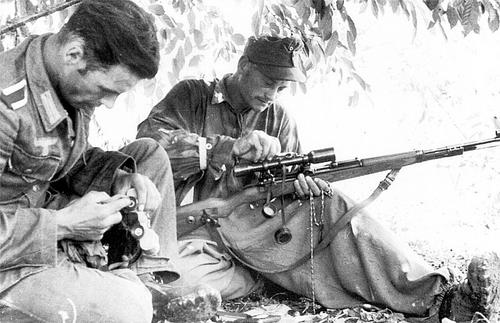
WW2 Daily Pic
11 Mar 2017, 23:07 PM
#2701
Posts: 250

11 Mar 2017, 23:40 PM
#2702
Posts: 245

For my American boys
12 Mar 2017, 22:42 PM
#2703
Posts: 250
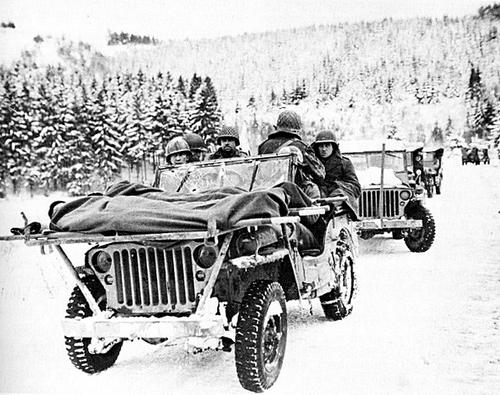
More Amerikan stuff
12 Mar 2017, 22:43 PM
#2704
Posts: 250
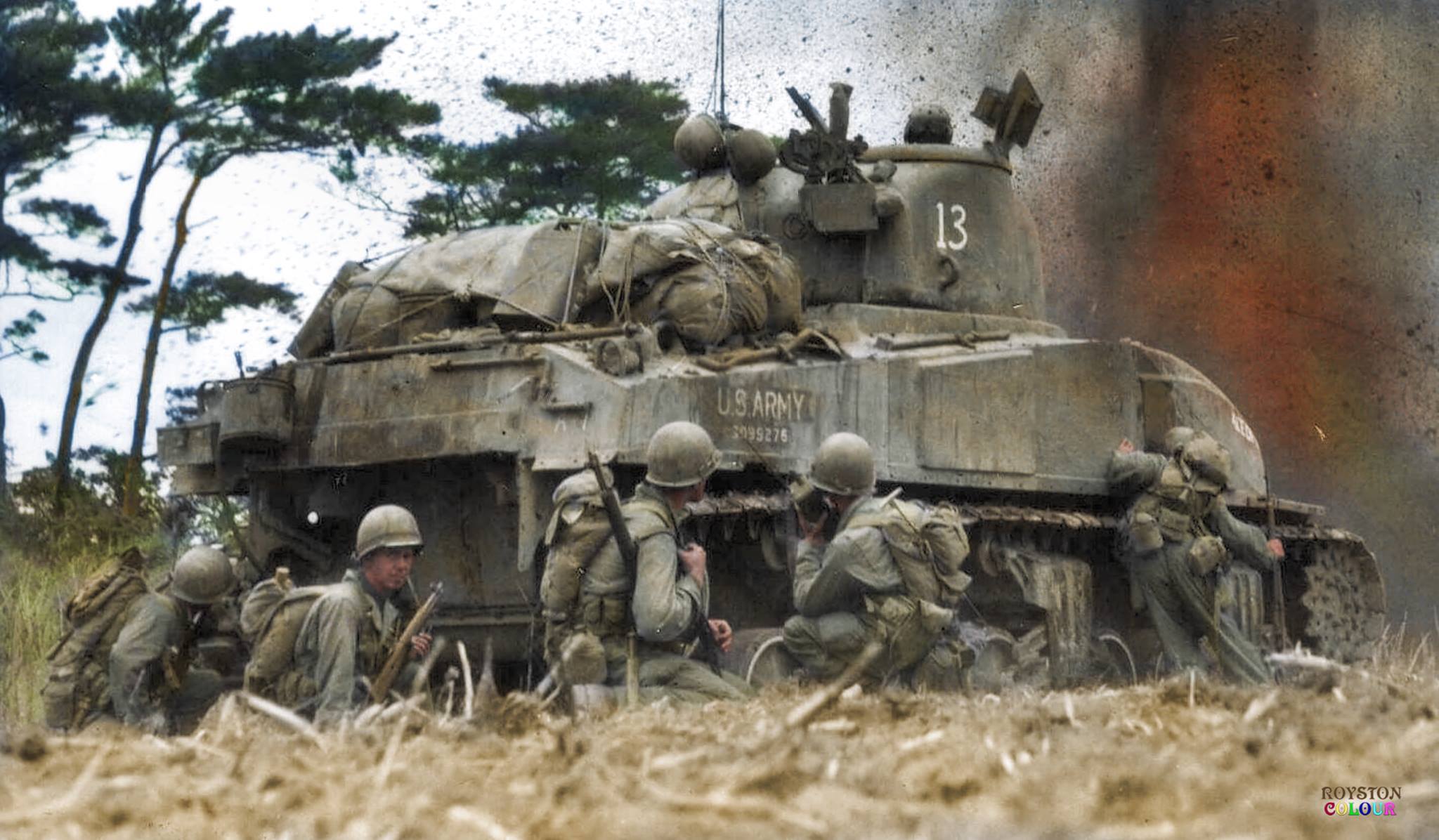
13 Mar 2017, 16:04 PM
#2705
Posts: 245
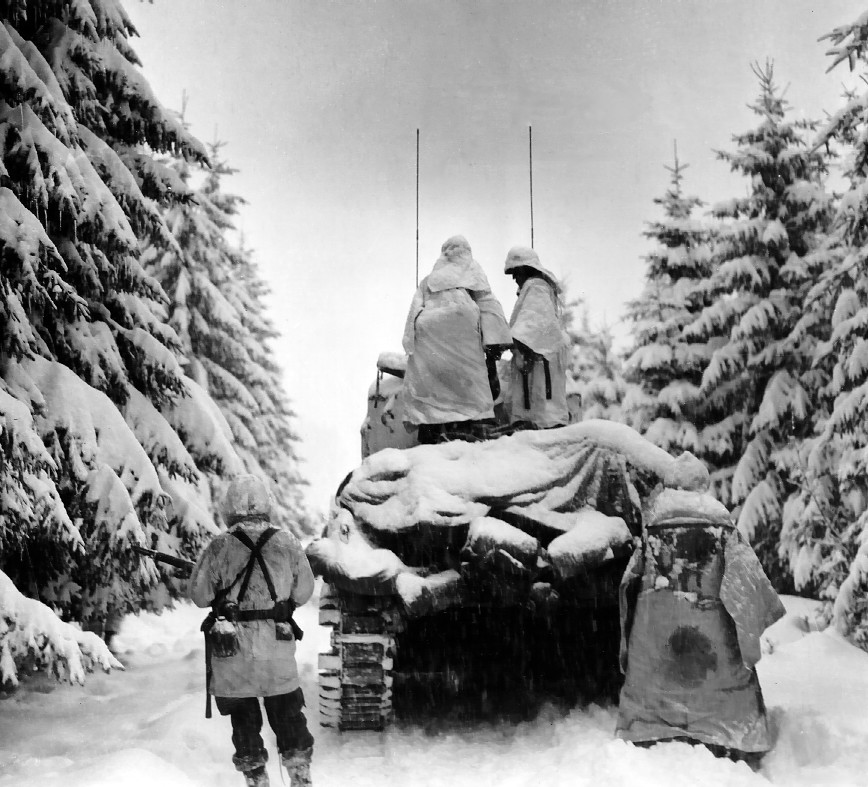
15 Mar 2017, 00:48 AM
#2706
Posts: 250
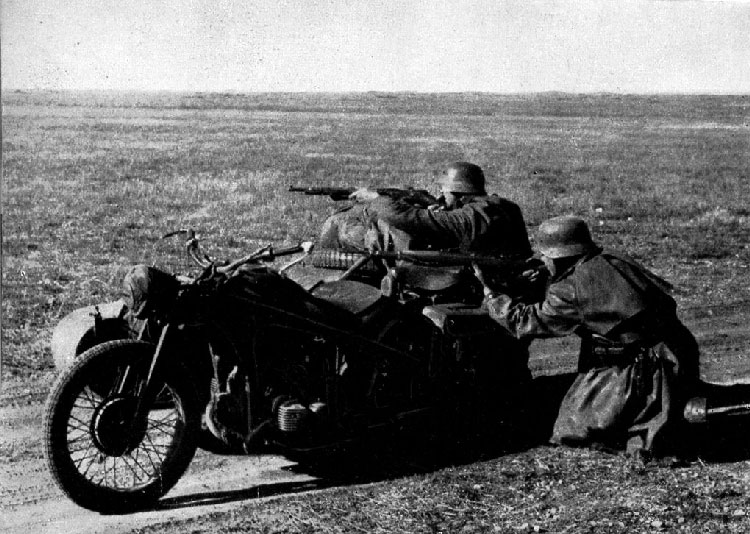
15 Mar 2017, 00:48 AM
#2707
Posts: 250
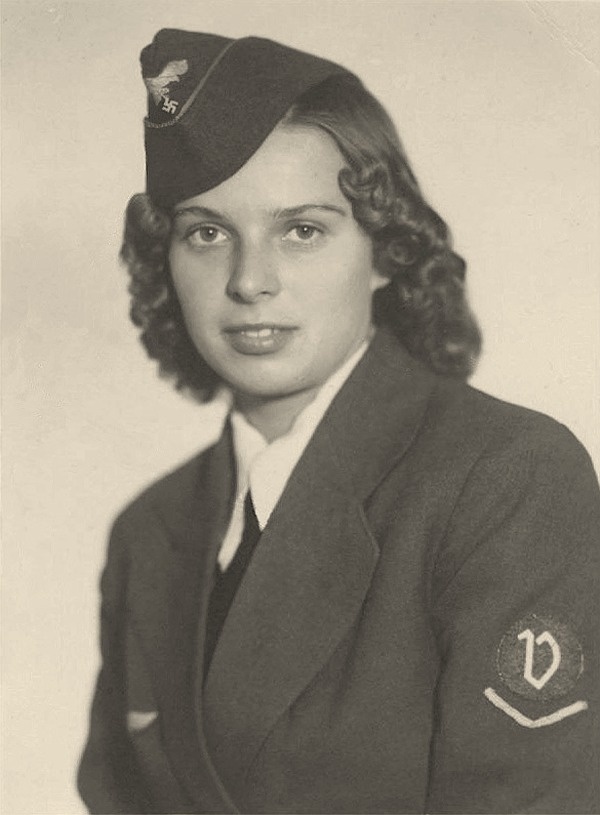
15 Mar 2017, 03:33 AM
#2708

Posts: 851 | Subs: 1
Who is the cute sheila with the cap Dappy?
16 Mar 2017, 01:02 AM
#2709
Posts: 250
I am unable to find out any details on this lovely girl (above). However, her uniform indicates she is a Luftwaffe Volunteer, an NCO in Administration.
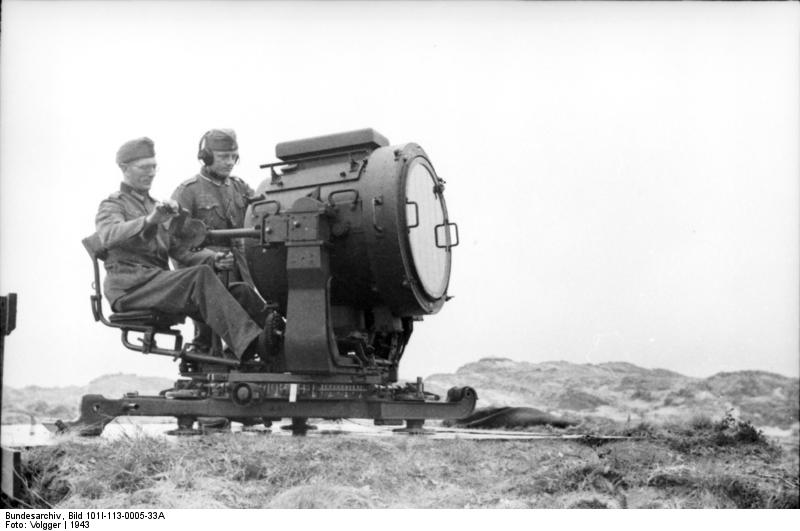

16 Mar 2017, 01:02 AM
#2710
Posts: 250
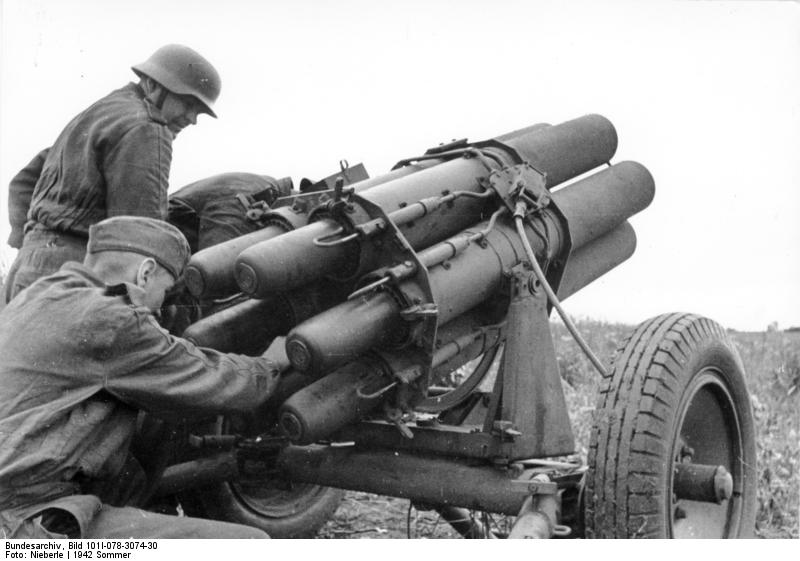
16 Mar 2017, 06:59 AM
#2711
Posts: 245

What appears to be veteran Soviets
17 Mar 2017, 00:48 AM
#2712
Posts: 250
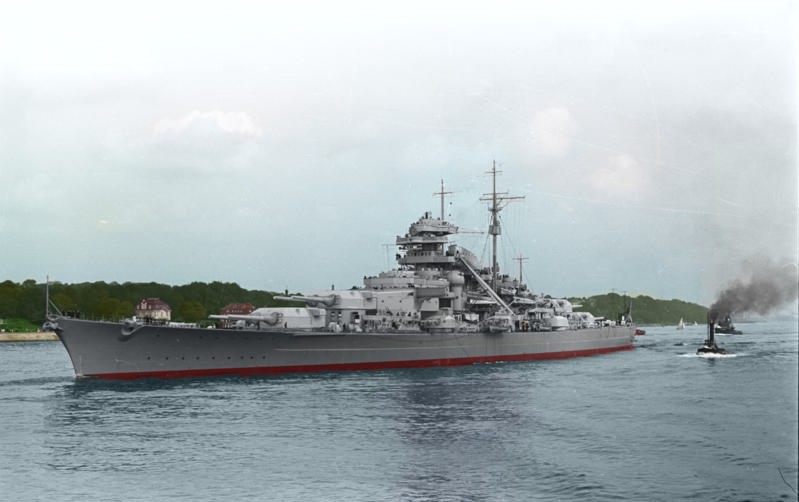
17 Mar 2017, 00:51 AM
#2713
Posts: 250
That was the Bismarck (above)
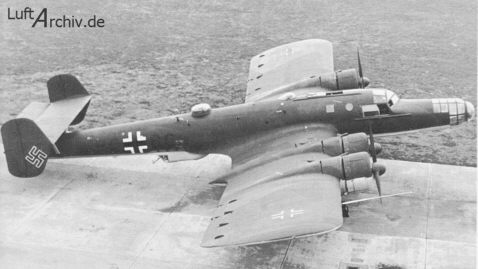
The Blohm & Voss BV 142 was a German civil aircraft developed for the transatlantic airmail service, originally designed for the German national airline Luft Hansa. The first prototype was flown on 11 October 1938. Soon after the start of World War II, it was proposed to convert all four prototype BV 142s to long-range maritime patrol aircraft. The BV 142 V2 thus underwent a trial modification. It was fitted with an extended nose section with extensive glazing (like the Heinkel He 111 H-6), defensive armament (a 7.92 mm/.312 in MG 15 machine gun in the nose, twin-beam positions, a ventral cupola, and a powered dorsal turret), a compartment for ordnance in the fuselage, and navigation and military radio equipment. The BV 142 V2, was redesignated BV 142 V2/U1 while the V1 was similarly converted. Both were used operationally from late 1940 and were posted to the Luftwaffe's second surveillance Group. This unit was assigned to the operations staff of Luftflotte III in France. However, their performance was disappointing, and after only a few missions, they were withdrawn from service in 1942. The two other aircraft (V3 and V4) were used as transport aircraft for the occupation of Denmark and in the Norway campaign with the KGr.z.b.V. 105 (Special combat team) and could transport 30 fully equipped soldiers over 4,000 km (2,490 mi). The ultimate fate of V3 and V4 is unknown. It was later planned to use the V1 and V2 to carry the Henschel GT 1200C guided torpedo, but the plan was scrapped.

The Blohm & Voss BV 142 was a German civil aircraft developed for the transatlantic airmail service, originally designed for the German national airline Luft Hansa. The first prototype was flown on 11 October 1938. Soon after the start of World War II, it was proposed to convert all four prototype BV 142s to long-range maritime patrol aircraft. The BV 142 V2 thus underwent a trial modification. It was fitted with an extended nose section with extensive glazing (like the Heinkel He 111 H-6), defensive armament (a 7.92 mm/.312 in MG 15 machine gun in the nose, twin-beam positions, a ventral cupola, and a powered dorsal turret), a compartment for ordnance in the fuselage, and navigation and military radio equipment. The BV 142 V2, was redesignated BV 142 V2/U1 while the V1 was similarly converted. Both were used operationally from late 1940 and were posted to the Luftwaffe's second surveillance Group. This unit was assigned to the operations staff of Luftflotte III in France. However, their performance was disappointing, and after only a few missions, they were withdrawn from service in 1942. The two other aircraft (V3 and V4) were used as transport aircraft for the occupation of Denmark and in the Norway campaign with the KGr.z.b.V. 105 (Special combat team) and could transport 30 fully equipped soldiers over 4,000 km (2,490 mi). The ultimate fate of V3 and V4 is unknown. It was later planned to use the V1 and V2 to carry the Henschel GT 1200C guided torpedo, but the plan was scrapped.
18 Mar 2017, 00:32 AM
#2714
Posts: 250
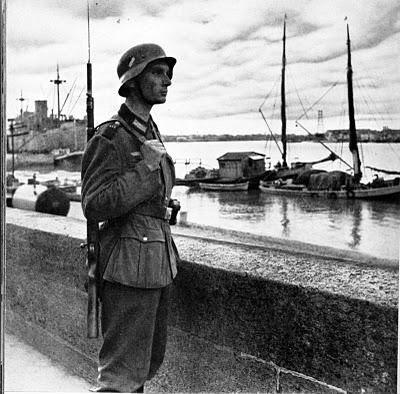
18 Mar 2017, 00:33 AM
#2715
Posts: 250
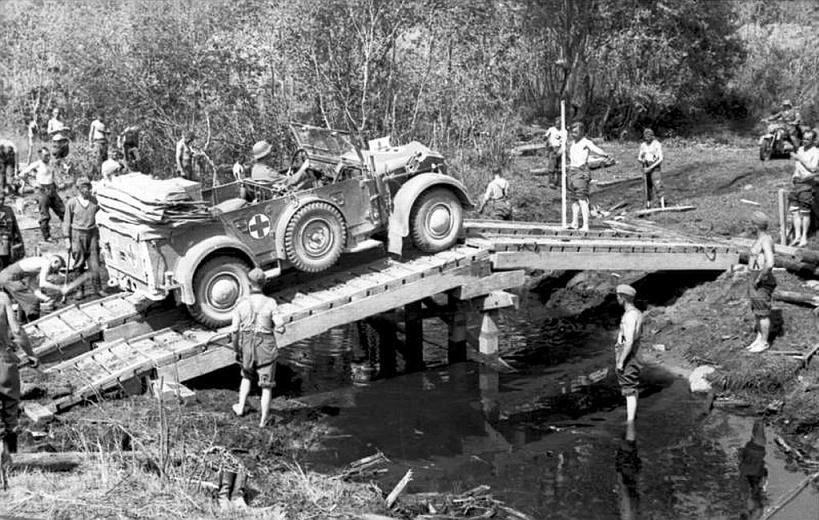
18 Mar 2017, 21:12 PM
#2716
Posts: 250









Within the Waffen-SS and Wehrmacht were several foreign nationalities which supported the German war effort during World War II. The Waffen-SS consisted of 38 divisions of which 19 were mixed (German or Volksdeutsche and others) or composed exclusively of other nationalities under German command. These divisions were racially White and were recruited from European countries. About 25 different European nationalities were members of the Waffen-SS: Albanians, Armenians, Belgians, Bulgarians, Bosnians, Croatians, Czechoslovaks, Danish, Estonians, Finnish, French, Greek, Hungarians, Netherlands, English, Estonians, Italians, Latvians, Lithuanians, Norwegians, Romanians, Russians, Spanish, Swedish and Ukrainians. Six out of ten members of the Waffen-SS were composed of foreigners.
However, the Wehrmacht had volunteers from other non-European races such as African, Indian (which included Hindus, Sikhs, Muslims, Christians and even Buddists), Arab, Chinese, Japanese, Korean, Turkmen, etc. There were also Jewish troops who voluntarily served the German army.
In March 1938 a Chinese officer named Chiang Wei-Kuo participated in the annexation of Austria with Germany. Chiang Wei-Kuo was the son of China’s nationalist leader Chiang Kai Shek. He was group commandant Panzer leader and managed his Panzers to control the occupied population. Several other Chinese persons were trained for service in the Wehrmacht, Luftwaffe and Kriegsmarine.
Battalion 43
The after the Japanese attack on Pearl Harbor the United States entered the global conflict. Many people in Asia believed the real enemy in the fight was the communism and the Soviet Union. For this reason many Asians from different countries went to Europe to join the military of the Third Reich. Several Asians already living in Europe were introduced to join the German Army. Asian volunteers were organized into their own battalions. The creation of OstBattalion-43 (Battalion 43) was incorporated to Wehrmacht and sent to the front in Russia.
Battalion 43 of the Wehrmacht consisted exclusively of East Asians from China, Japan, Korea and Mongolia. Also a minor part consisted of troops from Thailand and Indonesia. At the Russian front Battalion 43 suffered the same hardships as the German soldiers: cold, hunger, and Red Army. Battalion 43 fought from the Russian steppes to the fertile plains of Ukraine. These troops showed no fear of death and were quite feared by the Red Army. Japanese and Korean soldiers were the most fanatical within the battalion because of the bushido code of their religion. Mongols were more motivated because they suffered in their home country pressure of the USSR. The Chinese who were fearsome in battle fighting for a free China of Chiang Kai Shek and Mao Zedong's communism which were supported by Russia.
In early 1944 Battalion 43 withdrew from the eastern front and was sent to France and joined the Rommel's Army in Normandy. The mission of these was set next to the Coast Guard Channel to stop an Allied landing in the future, life in France Battalion was peaceful and quiet for several long months. On June 6, 1944 the Allies landed in Normandy by land, sea and air. Battalion 43 was at that time scattered along the coast where the Americans had landed. At the end of D-Day Battalion 43 had been completely crushed with most troops being killed and taken prisoner. On D-Day Battalion 43 ceased to exist. The few Asians who managed to escape were not allowed again unify as a Battalion.
Muslim
The only volunteer Muslim soldiers who joined the Waffen SS were those of 13th SS Mountain Division Handschar. However these were not Arabs but Bosnians and Croats, that is, ethnic Europeans.
Freies Arabien
The Saudi Freies Arabien was a legion of volunteers, mostly Muslims, from the Middle East, North Africa and parts of Southern Europe. These troops were recruited in 1943 and fought for the Wehrmacht in Balkans and the North African desert. By April 19, 1943 more than 20,000 Muslim volunteers were serving the German Reich. The Arab population was mostly Muslim but several Arabs were of Greek Orthodox faith. The Grand Mufti Muhammad Hajj Amin al-Husayni Legion helped with the recruitment of Muslim volunteers.
Deutsch-Arabische Kommando Truppe
The Deutsch-Arabische Truppe Kommando (Kodat) was established in Tunisia in early January 1943 as a unit of shock troops of the Arab Wehrmacht, Commanded by Lt. Col. Meyer-Ricks. At first, it consisted of three battalions of volunteers from the nations of the Maghreb: Morocco, Algeria and Tunisia. They used the French continental uniform khaki 1935 model unmarked except for a bracelet on his right arm, white with the inscription in black "Im Dienst der Deutschen Wehrmacht" ("Serving the German army), brown leather equipment French origin and German helmets.
Sub-officers and officers used the German regulation uniform coat on the right arm belonging to the "Orientkorps" used by the 287 and Sonderverband Sonderverband 288.
18 Mar 2017, 21:16 PM
#2717
Posts: 250
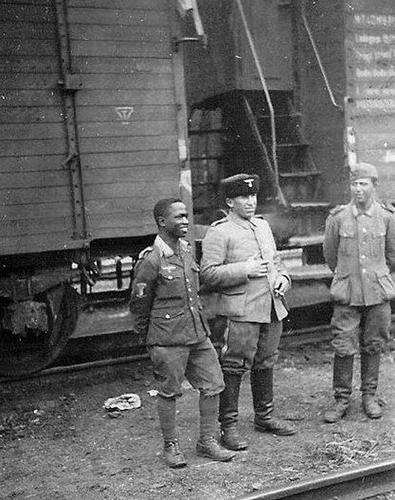
18 Mar 2017, 21:23 PM
#2718
Posts: 250
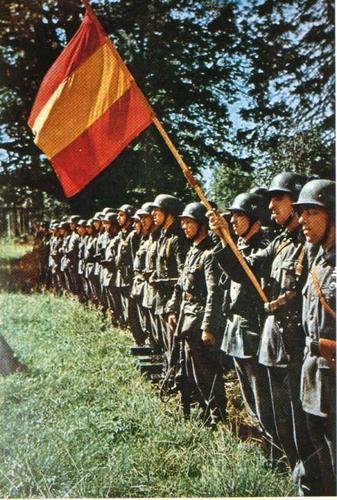
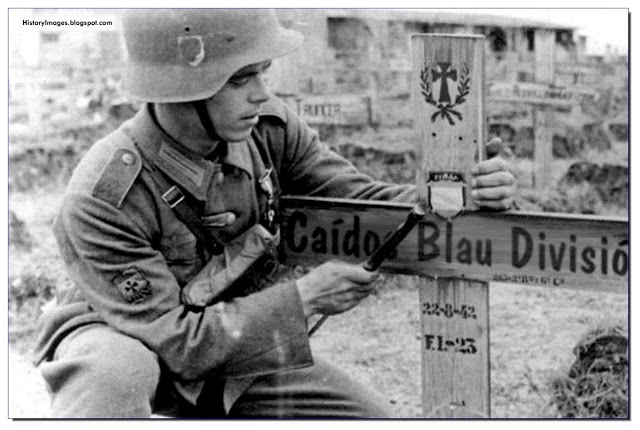
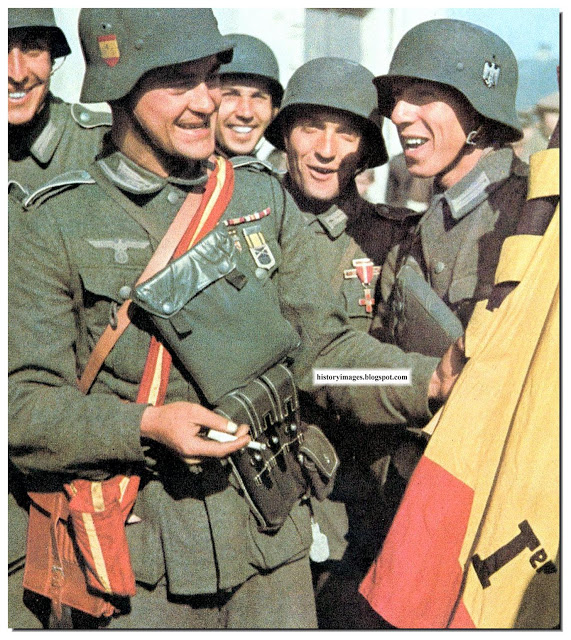
The Blue Division (Spanish: División Azul, German: Blaue Division, officially designated as División Española de Voluntarios by the Spanish Army and 250. Infanterie-Division in the German Army was a unit of Spanish volunteers that served in the German Army on the Eastern Front of the Second World War.Hitler approved the use of Spanish volunteers on June 24, 1941. Volunteers flocked to recruiting offices in all the metropolitan areas of Spain. Cadets from the officer training school in Zaragoza volunteered in particularly large numbers. Initially, the Spanish government was prepared to send about 4,000 men, but soon realized that there were more than enough volunteers to fill an entire division: 18,104 men in all, with 2,612 officers and 15,492 soldiers.Through rotation, as many as 45,482 Spanish soldiers served on the Eastern Front. They were awarded both Spanish and German military awards, and were the only division to be awarded a medal of their own, commissioned by Hitler.The casualties of the Blue Division and its successors included 4,954 men killed and 8,700 wounded. Another 372 members of the Blue Division, the Blue Legion, or volunteers of the Spanische-Freiwilligen Kompanie der SS 101 were taken prisoner by the victorious Red Army; 286 of these men were kept in captivity until April 2, 1954, when they returned to Spain aboard the ship Semiramis, supplied by the International Red Cross. Soldiers and officers of the Blue Division were awarded:
3 Knight Crosses (Oak Leaves).[7]
3 German Crosses in Gold.[7]
138 Iron Crosses First Class.
2,359 Iron Crosses Second Class.
2,216 War Merit Crosses with Swords.
Hitler referred to the division as "equal to the best German ones". During his table talks, he also said:
Vault of the Blue Division, in La Almudena cemetery, Madrid.
To troops, the Spaniards are a crew of ragamuffins. They regard a rifle as an instrument that should not be cleaned under any pretext. Their sentries exist only in principle. They don't take up their posts, or, if they do take them up, they do so in their sleep. When the Russians arrive, the natives have to wake them up. But the Spaniards have never yielded an inch of ground. One can't imagine more fearless fellows. They scarcely take cover. They flout death. I know, in any case, that our men are always glad to have Spaniards as neighbours in their sector.
18 Mar 2017, 21:38 PM
#2719
Posts: 2066
Interesting, surely doesn't support the official ww2 fairy tale for sure.
18 Mar 2017, 23:55 PM
#2720
Posts: 250
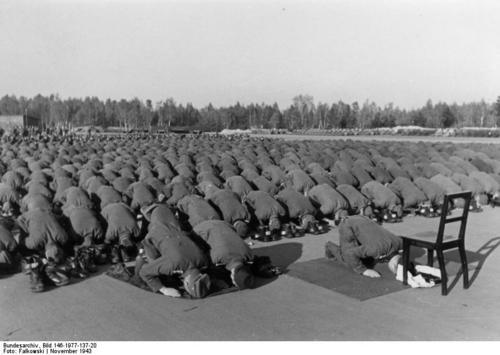
Dangerous Cloth: Very well said! After 50 years of "Allied" propaganda, only now are some of the real truths becoming known. This picture is a whole battalion of Muslims at prayer.
5 users are browsing this thread:
5 guests
Livestreams
 |
|
|
201 | ||
 |
|
|
17 | ||
 |
|
|
8 |
Ladders Top 10
-
#Steam AliasWL%Streak
- 1.831222.789+37
- 2.612220.736+6
- 3.35057.860+15
- 4.1110614.644+11
- 5.276108.719+27
- 6.306114.729+2
- 7.918405.694+2
- 8.262137.657+3
- 9.722440.621+4
- 10.1041674.607-2
Replay highlight
VS
-
 cblanco ★
cblanco ★ -
 보드카 중대
보드카 중대
-
 VonManteuffel
VonManteuffel -
 Heartless Jäger
Heartless Jäger

Einhoven Country


Honor it
9
Download
1236
Board Info
802 users are online:
802 guests
0 post in the last 24h
5 posts in the last week
34 posts in the last month
5 posts in the last week
34 posts in the last month
Registered members: 49125
Welcome our newest member, Xclusive
Most online: 2043 users on 29 Oct 2023, 01:04 AM
Welcome our newest member, Xclusive
Most online: 2043 users on 29 Oct 2023, 01:04 AM










